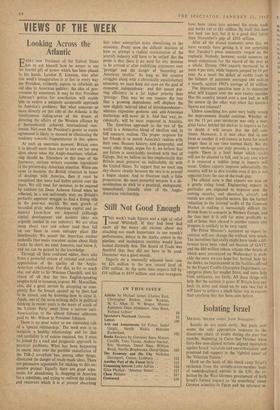Still Not Good Enough
nts week's trade figures sent a sigh of relief I round Whitehall. If they had been bad again all the hoary old excuses about not attaching too much importance to one month's performance, delays in the docks, orders in the pipeline, and inadequate statistics would have looked distinctly thin. The Board of Trade was thankful that they did not have to be used. December was a good month.
Exports on a seasonally adjusted basis rose by £24 million to the new record level of £381 million. At the same time imports fell by £19 million to £455 million, and once re-exports have been taken into account the crude trade gap works out at £61 million. By itself this does not look too hot, but it is a good deal better than November's gap of £103 million.
After all the dismal economic news that we have recently been getting it is not surprising that Tuesday's press comments verged on the euphoric. Nobody, however, could summon up much enthusiasm for the record of the year as a whole. During 1964 exports increased by a mere 4 per cent, while imports jumped by 14 per cent. As a result the deficit of visible trade in the balance of payments averaged £44 million a month, against 1963's average of £4 million.
The important question now is to determine what will happen over the next twelve months. Has the country turned over a new leaf, or will the seesaw tip the other way when this month's figures are released?
Unless something has gone very badly wrong the improvement should continue. Whether or not the 15 per cent surcharge was only a mar- ginal factor behind the decline in imports so far, no doubt it will ensure that the fall con- tinues. Moreover, it is now clear that in one form or another it will remain in force for much longer than at one time seemed likely. But the import surcharge can only provide a temporary respite. There is a limit below which stocks will not be allowed to fall, and in any case w hen it is removed a sudden jump in imports will occur. Unless exports improve substantially the country will be in dire trouble even if this is not apparent from the size of the trade gap.
The official view is that exports arc now on a gently rising trend. Engineering exports in particular are expected to improve over the coming months, and chemicals, aircraft and metals are other hopeful sectors. But the further reduction in the internal tariffs of the Common Market is making it increasingly difficult for British firms to compete in Western Europe, and the fact that it is still far more profitable to sell at home than abroad is another reason why progress is unlikely to be very rapid.
The Prime Minister's statement on export in- centives will not change the outlook very much. Tax incentives that really might have made a dif- ference have been ruled out because of GATT. and the £80 million rebate scheme (the details of which were announced on Wednesday) is prob- ably the most we can hope for. Instead, help for the docks, an improvement in the facilities offered by the Export Credits Guarantee Department, co- operptive plans for smaller firms, and more help from embassies, are likely. All these things will help. But the outlook is grave. If Britain is to pay back its debts and stand on its own two feet it will haye to achieve a much faster rise in exports than anything that has been seen before.






































 Previous page
Previous page